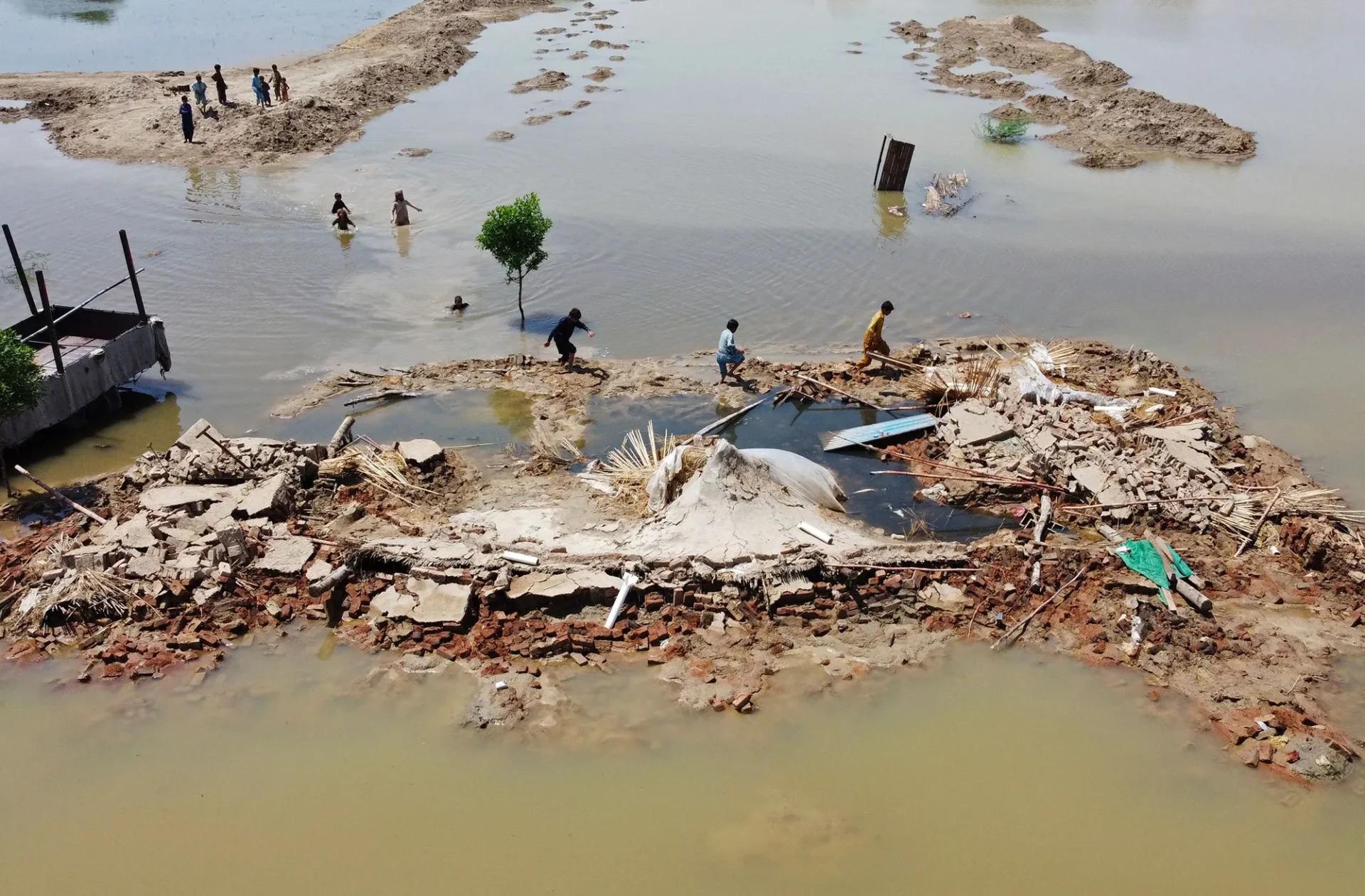The Shanghai Cooperation Organization (SCO), that came to be in 2001 as an extension of the ‘Shanghai Five,’ is as an intergovernmental body that includes nations primarily from Central Asia and several from South Asia, encompassing a total of 9 member states. SCO is pivotal in confronting the pressing issue of climate change, a critical challenge faced by the region. Developing nations such as Pakistan and fellow SCO members are currently grappling with the complexities of climate disaster management and the shift towards renewable energy sources, with the aim of reducing their reliance on fossil fuels.
The role of the SCO is not confined to the Eurasian region alone. The SCO, in its capacity as a multilateral forum, has the potential to serve as a conduit for fostering synergies between its members, the Paris Agreement, and the UN SDGs concerning climate-related issues. The issue of climate vulnerability is not exclusive to the Eurasian region; it has broad implications that can influence the global environment. The repercussions of climate disasters on trade routes in the Eurasian and Central Asian regions, as well as the release of methane and carbon emissions from melting ice in the Asian Arctic region, underscore the necessity of addressing this issue as a matter of global urgency, rather than merely a regional concern.
SCO member countries, especially developing countries like Pakistan and other Central Asian nations, are on the front lines of the impacts of climate change. The increasing frequency of flash floods and landslides due to monsoons and glacier melt, as well as pressure on transboundary water resources, which triggers potential conflicts and food crises, as well as damage to critical infrastructure in mountainous and lowland areas, have become major challenges that these developing member countries of the SCO must face.
The monsoon deluge that occurred in the province of Khyber Pakhtunkhwa, Pakistan, illustrates that the threats to Pakistan are not merely terrorism or geopolitical conflicts with India. The issues of climate change and the environment, which have often been sidelined and not given top priority at previous SCO Summits, have become the biggest challenges for developing countries, especially Pakistan. The flash floods that swept through northern Pakistan resulted in over 300 lives lost and 150 people missing within just two days.
Read More: Everything You Need to Know About SCO Tianjin Summit 2025
This incident certainly marks the highest death toll in Pakistan for the year 2025, six times more than the casualties caused by the Pakistan-India conflict in 2025 or any armed conflict in this decade. Pakistan and other developing countries still face the same problems related to climate change. The lack of facilities and funding for clean energy technology is a serious obstacle to the vision of making all SCO member countries free from high-emission energy.
This can serve as an example that the minimal implementation in the field concerning the resolutions and agreements signed at the SCO Summit in Islamabad 2024, related to the climate change issue which has caused many casualties due to climate disasters, especially in Pakistan throughout this year, can be used as a reason that the climate change issue must become a top priority for the SCO Summit in China 2025.
It has been almost a year since the last SCO summit was held on October 15 and 16, 2024, where Pakistan hosted the meeting. Questions regarding the role of the SCO in addressing climate change issues in its member countries, one of which is Pakistan, have resurfaced, especially amidst the climate disaster currently faced by Pakistan due to the monsoon deluge in the Khyber Pakhtunkhwa province, causing many casualties. This raises the question of whether the decisions and resolutions related to climate change agreed upon at that meeting are a mission that must be implemented by its member countries or merely diplomatic rhetoric.
The topics of discussion and resolutions related to climate change issues at that meeting included the transition to renewable energy sources such as solar, hydro, and wind to reduce the regional carbon footprint; strengthening the framework for mitigation and disaster preparedness, including early warning systems and community resilience programs; managing transboundary water resources to prevent conflicts and ensure water availability for the agricultural and industrial sectors; and exploring options for establishing a Regional Climate Fund that would finance green projects and future climate adaptation, while opening a space for discussion to critique whether the agreements and resolutions align with the challenges and realities on the ground.
Read More: Kaleidoscope Cultural Bazaar Steals the Show at SCO Youth Festival
The diplomatic commitment seems not to align with the implementation on the ground. Resolutions such as the establishment of the Regional Climate Fund are still not implemented, as this program is still in the technical formulation and budget negotiation stage among SCO members. The installation of early warning systems to mitigate climate disasters in Pakistan is also hindered by a national budget that is overly focused on security and basic infrastructure sectors. Technological and capacity gaps, such as the lack of meteorological experts and IT technicians for the installation, calibration, and maintenance of warning infrastructure, along with unstable telecommunications and electricity networks in the mountainous districts of Khyber Pakhtunkhwa and Balochistan, limit the implementation on the ground.
The issues of environment and climate change can no longer be sidelined; the vulnerability of developing countries in facing disasters caused by unpredictable climate changes, which can potentially cause many casualties, along with the loss of many livelihoods due to climate disasters, can lead to economic instability in the country. For example, the damage to infrastructure, agriculture, and livestock caused by flooding in Khyber Pakhtunkhwa adds to the country’s losses amounting to approximately US$ 49 million.
The issue of climate change also pressures and narrows the movement space of the younger generation, which is the generation that supports the progress of a nation. Climate change indirectly kills the big dreams and future of young people. With the disappearance of family income sources due to climate disasters, it creates a domino effect on the threatened ability of families to finance their children’s education. This often forces young people to drop out of school and have to work to earn a living to meet their family’s needs, sacrificing the golden phase of young people to learn and develop their creativity.
With such a large footprint of victims, mobilizing the attention and resources of the SCO for climate mitigation and adaptation is no longer an option, but rather a strategic necessity for the safety of tens of millions of lives. The upcoming 2025 SCO Summit in China must make climate change a primary issue that needs to be urgently addressed.
On the other hand, the green energy transition that is intended to be implemented in the SCO member countries aligns with the SCO’s plan on China Space Day in April 2025, where the SCO presents the plan for an “environmental and climate satellite array”, an eight-virtual constellation to monitor CO₂, aerosols, sea surface temperature, and other important variables as a sign of technological readiness to be enhanced within the SCO framework for 2025.
Read More: 5-Day SCO Media & Think Tank Summit Foster Collaboration
Pakistan also has significant opportunities to leverage this momentum in efforts to develop an environmentally friendly industry related to sodium-ion batteries. The abundant sodium resources in Pakistan could be an opportunity for the sustainable development of sodium-ion batteries, which could eventually replace the use of lithium-ion batteries in electric vehicles (EVs).
In this regard, Pakistan must quickly improve itself, Pakistan must strengthen the PMD and the Meteorological Agency with access to real-time data and AI-based early warning systems, accelerate the Green Pakistan Upscaling program (reforestation, ecosystem restoration) according to the 2024 BTR, enhance village capacity through climate adaptation training and livelihood diversification, and integrate climate planning into the National Medium Term Development Plan.
The SCO must also move swiftly, establishing the SCO Green Belt program as a flagship initiative for adaptation, complete with annual achievement indicators and independent audits. Furthermore, the SCO Climate Fund should be promptly implemented and jointly managed to finance high-priority projects in member states. Through these targeted steps, SCO China 2025 can transform diplomatic promises into concrete actions, ensuring the protection of millions of lives and ecosystems across the region.
*The views expressed in this article are the author’s own and do not necessarily reflect the editorial policy of TDI.

Ali Abdul Halim
Ali Abdul Halim is an Indonesian student in International Islamic University of Islamabad and an intern at the Consortium for Asia-Pacific Studies (CAPS) and can be reached at aliabdh007@gmail.com



